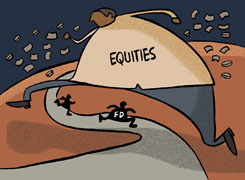Retirees: Fixed Deposits or Debt Funds?
Ramalingam Kalirajan |10908 Answers |Ask -Follow
Mutual Funds, Financial Planning Expert - Answered on Nov 02, 2024
He has an MBA in finance from the University of Madras and is a certified financial planner.
He is the director and chief financial planner at Holistic Investment, a Chennai-based firm that offers financial planning and wealth management advice.... more

is bank fixed deposit or debt fund which is safer for retired people
1. Safety and Security of Investment
For retired individuals, safety is the primary concern. Here’s how FDs and Debt Funds compare:
Fixed Deposits: Bank FDs are among the safest investment options. Most banks insure deposits up to Rs 5 lakhs, offering a layer of protection. FDs provide predictable and guaranteed returns, which can be reassuring.
Debt Mutual Funds: Debt funds invest in bonds, government securities, and other debt instruments. While generally safe, they carry some risks related to market fluctuations and interest rate changes. Debt funds aren't as guaranteed as FDs but are relatively stable in the short term.
Assessment: If safety is your top priority, bank FDs are slightly more secure. Debt funds carry some risk, though conservative options like liquid funds tend to be stable.
2. Returns Potential
Both FDs and Debt Funds provide moderate returns but differ in their approach:
Fixed Deposits: FD interest rates are set when you invest, so your returns are predictable. However, returns are often lower than those of debt funds. FDs are also sensitive to inflation, which can erode purchasing power over time.
Debt Mutual Funds: Debt funds have the potential to offer better returns, particularly in a declining interest rate environment. Returns depend on the types of debt instruments held in the fund. Over time, debt funds tend to generate inflation-adjusted growth.
Assessment: Debt funds may yield slightly better returns than FDs. They are also better suited for those seeking long-term income that can grow with inflation.
3. Liquidity and Accessibility
Retired individuals often need quick access to funds. Here’s how FDs and Debt Funds compare:
Fixed Deposits: Breaking an FD before maturity may incur penalties, reducing effective returns. However, some banks offer flexible FDs with minor penalties for early withdrawal.
Debt Mutual Funds: Debt funds generally offer higher liquidity than FDs, especially liquid funds. Withdrawals are processed within a day or two without penalties, although they may be subject to exit loads within a short period after purchase.
Assessment: Debt funds are more liquid, making them ideal for retirees who may need access to funds without facing penalties.
4. Tax Implications for Retirees
Taxation affects returns significantly, especially for retirees relying on a fixed income.
Fixed Deposits: FD interest is added to your income and taxed as per your tax slab. For retirees in higher tax brackets, this can considerably reduce net returns. There is no special tax treatment for long-term holding.
Debt Mutual Funds: Debt funds offer some tax efficiency, especially with long-term holdings. For debt funds held over three years, long-term capital gains tax applies at 20% with indexation benefits, which can lower your tax liability.
Assessment: Debt funds offer better tax efficiency than FDs for retirees in higher tax brackets, particularly for investments held over three years.
5. Inflation Protection
Retirement portfolios need to account for inflation to preserve purchasing power:
Fixed Deposits: FD returns are fixed and may fall short if inflation rises. Over time, inflation can erode the real value of FD returns, impacting your buying power.
Debt Mutual Funds: Some debt funds can offer returns that keep pace with inflation, particularly when invested over the long term. This is an advantage if you’re aiming to maintain income growth.
Assessment: Debt funds may provide better inflation protection, especially with longer investment horizons.
6. Flexibility and Diversification
Flexibility in managing funds and diversifying income sources is beneficial for retirees:
Fixed Deposits: FDs are straightforward but lack flexibility in returns. They do not allow diversification beyond different bank schemes and tenures.
Debt Mutual Funds: Debt funds offer various types, like liquid funds, short-term funds, and corporate bond funds. This flexibility allows retirees to diversify based on risk tolerance and income needs.
Assessment: Debt funds offer greater flexibility, making them suitable for retirees who wish to diversify income sources.
7. Evaluating Debt Fund Types for Low-Risk Investment
For retirees, certain debt fund categories are safer and designed for low-risk investors:
Liquid Funds: These funds invest in short-term instruments and are highly stable. They offer quick access to funds without significant volatility.
Ultra-Short-Term Funds: These hold slightly longer-term instruments than liquid funds but remain low-risk. They’re suitable for retirees seeking modest returns with low volatility.
Corporate Bond Funds: These invest in high-quality corporate bonds. Though riskier than government securities, they provide higher returns while maintaining reasonable safety.
Assessment: Choosing low-risk debt fund categories can provide retirees with stable income and reasonable returns without significant risk.
8. Considerations for Regular vs Direct Plans
When investing in mutual funds, retirees may face a choice between regular and direct plans:
Direct Plans: While direct funds have lower expense ratios, they lack guidance. For retirees, managing fund selections and rebalancing might be challenging without professional assistance.
Regular Plans through CFP: A Certified Financial Planner can help with fund selection, performance monitoring, and adjustments to align with financial goals. This guidance can be particularly beneficial for retirees.
Assessment: Investing through a regular plan with CFP support is ideal, offering professional management without the need to make direct fund decisions.
9. Finally
Both Fixed Deposits and Debt Funds can serve specific needs for retired investors. FDs are safe with predictable returns, while debt funds offer higher returns, tax efficiency, and flexibility. For retirees, a mix of both may provide an optimal balance. Bank FDs offer security, while low-risk debt funds add growth and tax benefits. Consider consulting a Certified Financial Planner to align your investments with your retirement goals.
Best Regards,
K. Ramalingam, MBA, CFP,
Chief Financial Planner,
www.holisticinvestment.in
https://www.youtube.com/@HolisticInvestment
You may like to see similar questions and answers below
Milind Vadjikar | Answer |Ask -Follow
Insurance, Stocks, MF, PF Expert - Answered on Nov 02, 2024
Milind Vadjikar | Answer |Ask -Follow
Insurance, Stocks, MF, PF Expert - Answered on Nov 02, 2024
Milind Vadjikar | Answer |Ask -Follow
Insurance, Stocks, MF, PF Expert - Answered on Jan 03, 2025
Ramalingam Kalirajan |10908 Answers |Ask -Follow
Mutual Funds, Financial Planning Expert - Answered on Jun 21, 2025
Ramalingam Kalirajan |10908 Answers |Ask -Follow
Mutual Funds, Financial Planning Expert - Answered on Dec 20, 2025
Ramalingam Kalirajan |10908 Answers |Ask -Follow
Mutual Funds, Financial Planning Expert - Answered on Dec 20, 2025
Naveenn Kummar |237 Answers |Ask -Follow
Financial Planner, MF, Insurance Expert - Answered on Dec 20, 2025
Ramalingam Kalirajan |10908 Answers |Ask -Follow
Mutual Funds, Financial Planning Expert - Answered on Dec 19, 2025
Nayagam P P |10859 Answers |Ask -Follow
Career Counsellor - Answered on Dec 19, 2025
Ramalingam Kalirajan |10908 Answers |Ask -Follow
Mutual Funds, Financial Planning Expert - Answered on Dec 19, 2025
Ramalingam Kalirajan |10908 Answers |Ask -Follow
Mutual Funds, Financial Planning Expert - Answered on Dec 19, 2025
Ramalingam Kalirajan |10908 Answers |Ask -Follow
Mutual Funds, Financial Planning Expert - Answered on Dec 19, 2025
Radheshyam Zanwar |6751 Answers |Ask -Follow
MHT-CET, IIT-JEE, NEET-UG Expert - Answered on Dec 19, 2025
Radheshyam Zanwar |6751 Answers |Ask -Follow
MHT-CET, IIT-JEE, NEET-UG Expert - Answered on Dec 19, 2025











.jpg)












